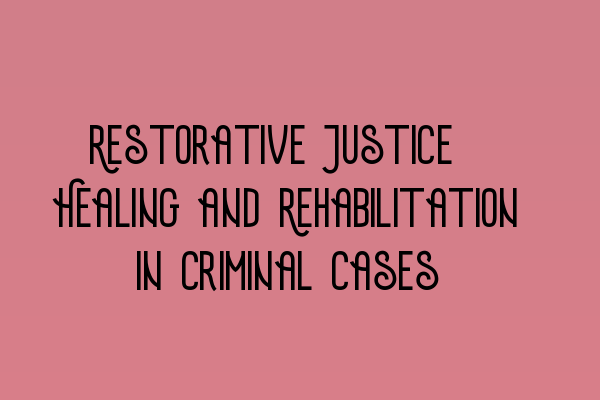Restorative Justice: Healing and Rehabilitation in Criminal Cases
In the criminal justice system, punishment has traditionally been the primary focus. However, there is a growing recognition that punitive measures alone are not always effective in addressing the underlying causes of criminal behavior or in achieving long-term rehabilitation. Restorative justice offers an alternative approach, one that emphasizes healing and reconciliation between the offender, victim, and the wider community.
“Restorative justice allows victims to regain their voice, offenders to take responsibility for their actions, and communities to actively participate in the process of healing and rehabilitation.”
Keywords: SQE 1 Practice Exam Questions, SQE 1 Practice Mocks FLK1 FLK2, SQE 2 Preparation Courses, SQE 1 Preparation Courses, SRA SQE Exam Dates
Understanding Restorative Justice
Restorative justice is an approach that aims to repair the harm caused by crime by focusing on the needs of victims, offenders, and the community. It recognizes that crime affects everyone involved, and seeks to address the emotional, psychological, and social consequences of criminal behavior.
Unlike traditional punitive methods, restorative justice encourages the active participation of all parties in resolving conflicts and finding solutions. It prioritizes communication, empathy, and understanding, allowing victims to regain their voice, offenders to take responsibility for their actions, and communities to actively participate in the process of healing and rehabilitation.
The Benefits of Restorative Justice
Restorative justice offers numerous benefits over traditional punitive measures:
- Victim Satisfaction: Restorative justice provides victims with an opportunity to be heard, to ask questions, and to receive answers directly from the offender. This can bring a sense of closure, satisfaction, and empowerment.
- Offender Accountability: By actively engaging in dialogue with victims and taking responsibility for their actions, offenders are more likely to gain insight into the impact of their behavior and develop a genuine desire to make amends.
- Community Involvement: Restorative justice involves the community in the process, promoting social connectedness and collective responsibility in addressing crime. This can contribute to stronger, safer communities.
- Reduced Recidivism: Studies have shown that restorative justice programs can lead to lower rates of re-offending compared to traditional punishment alone. By addressing the underlying causes of criminal behavior, restorative justice supports long-term rehabilitation and reintegration into society.
Implementing Restorative Justice
Restorative justice can take various forms, including victim-offender mediation, family group conferences, and community reparative boards. These processes involve facilitated dialogues between the victim and the offender, where they have the opportunity to express their feelings, discuss the harm caused, and work towards a mutually agreed resolution.
Training for professionals involved in restorative justice is crucial to ensure effective and ethical implementation. SQE Criminal Law & Practice Law UK offers comprehensive SQE 2 Preparation Courses that cover restorative justice principles and practices.
The Future of Justice
Restorative justice has gained recognition and support from legal professionals, policymakers, and communities around the world. Its emphasis on healing, rehabilitation, and community engagement aligns with a more holistic and humanistic approach to justice.
As aspiring legal professionals, it is crucial for future solicitors to understand and advocate for restorative justice principles. By incorporating restorative justice into their practice, solicitors can contribute to a more equitable and effective criminal justice system.
Conclusion
Restorative justice offers a promising alternative to traditional punitive measures in the criminal justice system. By prioritizing healing, rehabilitation, and community involvement, it provides an opportunity for victims to be heard, offenders to take responsibility, and communities to actively participate in the process of justice.
To prepare for a career in criminal law and understand the principles of restorative justice, consider exploring SQE Criminal Law & Practice Law UK’s SQE 1 Preparation Courses. These courses will provide you with the knowledge and skills necessary to navigate complex criminal cases and shape the future of justice.
